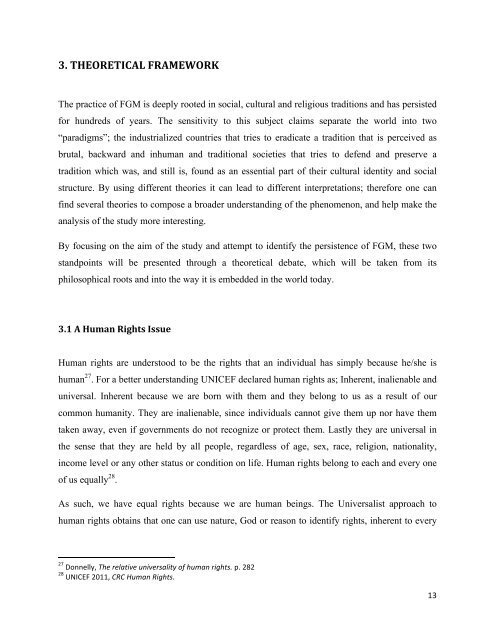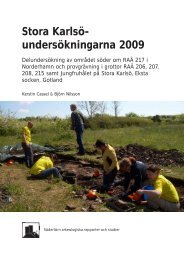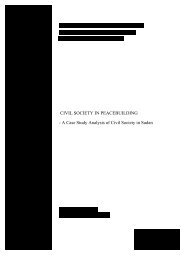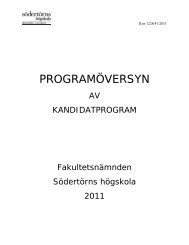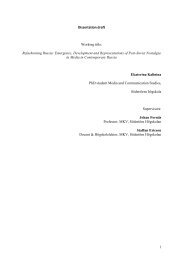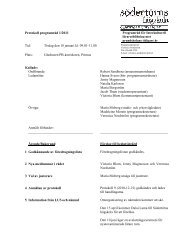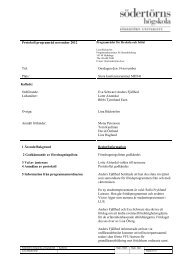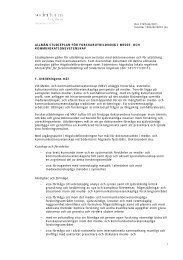Underlying Reasons for the Persistence of Female Genital Mutilation
Underlying Reasons for the Persistence of Female Genital Mutilation
Underlying Reasons for the Persistence of Female Genital Mutilation
You also want an ePaper? Increase the reach of your titles
YUMPU automatically turns print PDFs into web optimized ePapers that Google loves.
3. THEORETICAL FRAMEWORK <br />
The practice <strong>of</strong> FGM is deeply rooted in social, cultural and religious traditions and has persisted<br />
<strong>for</strong> hundreds <strong>of</strong> years. The sensitivity to this subject claims separate <strong>the</strong> world into two<br />
“paradigms”; <strong>the</strong> industrialized countries that tries to eradicate a tradition that is perceived as<br />
brutal, backward and inhuman and traditional societies that tries to defend and preserve a<br />
tradition which was, and still is, found as an essential part <strong>of</strong> <strong>the</strong>ir cultural identity and social<br />
structure. By using different <strong>the</strong>ories it can lead to different interpretations; <strong>the</strong>re<strong>for</strong>e one can<br />
find several <strong>the</strong>ories to compose a broader understanding <strong>of</strong> <strong>the</strong> phenomenon, and help make <strong>the</strong><br />
analysis <strong>of</strong> <strong>the</strong> study more interesting.<br />
By focusing on <strong>the</strong> aim <strong>of</strong> <strong>the</strong> study and attempt to identify <strong>the</strong> persistence <strong>of</strong> FGM, <strong>the</strong>se two<br />
standpoints will be presented through a <strong>the</strong>oretical debate, which will be taken from its<br />
philosophical roots and into <strong>the</strong> way it is embedded in <strong>the</strong> world today.<br />
3.1 A Human Rights Issue <br />
Human rights are understood to be <strong>the</strong> rights that an individual has simply because he/she is<br />
human 27 . For a better understanding UNICEF declared human rights as; Inherent, inalienable and<br />
universal. Inherent because we are born with <strong>the</strong>m and <strong>the</strong>y belong to us as a result <strong>of</strong> our<br />
common humanity. They are inalienable, since individuals cannot give <strong>the</strong>m up nor have <strong>the</strong>m<br />
taken away, even if governments do not recognize or protect <strong>the</strong>m. Lastly <strong>the</strong>y are universal in<br />
<strong>the</strong> sense that <strong>the</strong>y are held by all people, regardless <strong>of</strong> age, sex, race, religion, nationality,<br />
income level or any o<strong>the</strong>r status or condition on life. Human rights belong to each and every one<br />
<strong>of</strong> us equally 28 .<br />
As such, we have equal rights because we are human beings. The Universalist approach to<br />
human rights obtains that one can use nature, God or reason to identify rights, inherent to every<br />
27 Donnelly, The relative universality <strong>of</strong> human rights. p. 282 <br />
28 UNICEF 2011, CRC Human Rights. <br />
13


